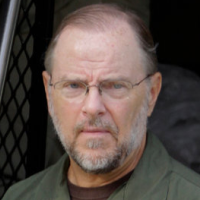Ex-Enron Chief Who Helped Wreck California’s Economy Gets 10 Years Lopped off His Sentence

“What is the difference between California and the Titanic? At least when the Titanic went down, the lights were on.”
—Jeffrey Skilling
Yuk, yuk, yuk. Those were good times in the late ‘90s. Enron Corporation, the Houston-based company where Jeffrey Skilling was the number two guy, was revolutionizing the way America priced its energy, making billions of dollars and, in the process, nearly bankrupting the state of California.
Skilling, who was chief operating officer, was found guilty in 2006 of securities fraud, insider trading, conspiracy and lying to auditors, and sentenced to 24 years in prison. He appealed the sentence and last week it was reduced by 10 years, making him eligible for release in 2017 with credit for good behavior.
U.S. District Judge Simeon Lake finalized the deal after Skilling agreed to stop fighting the terms of his original sentencing. He will give up $42 million in restitution and drop his threat to sue prosecutors. The money is to be distributed to victims of Enron fraud, some of whom were not happy at word of his good fortune.
“By entering into this early release agreement, a clear message will be sent to corporate C.E.O.’s that if you get caught with the hand in the cookie jar, you will get little more than a slap on the wrist,” Andrew Stoltmann, a lawyer representing some of the victims, told the New York Times.
Skilling, who testified at his trial that he was “absolutely innocent,” was just one of two dozen Enron employees who either pleaded guilty or were convicted of crimes. They are all out of jail now. Chief Financial Officer Andrew Fastow pleaded guilty to fraud in 2004, testified against Skilling and served five years of a 10-year sentence.
Enron Chairman Kenneth Lay died six weeks after being found guilty of conspiracy and fraud, but his conviction was thrown out when he died six weeks after his trial ended.
CNBC senior editor John Carney made a spirited defense of Skilling getting out early, arguing that he was wrongly sentenced in the first place. He didn’t deprive other people of “honest services,” couldn’t get his trial moved from inhospitable Houston and it “was one of the harshest sentences ever handed down for a white-collar crime,” Carney wrote, noting that Skilling received a sentence 13 years longer than Al Capone. It wasn’t clear whether he thought Capone got off easy.
Skilling joined Enron in 1990 and led its transformation from a pipeline operator to global energy-trading giant. Its demise cost investors billions, employees their pensions and corporate pirates their reputations as brilliant, innovative entrepreneurs.
It also cost California dearly. Enron’s market manipulations, empowered by market deregulation, led to blackouts, skyrocketing electricity prices, the Pacific Gas & Electric Company bankruptcy and, ultimately, the recall of Democratic Governor Gray Davis and the election of Republican Arnold Schwarzenegger. Lawsuits have wrung billions from companies that joined Enron in the festivities, and continue to this day.
–Ken Broder
To Learn More:
Former Enron CEO Skilling’s Sentence Cut to 14 Years (by Kristen Hays and Anna Driver, Reuters)
Prison Sentence of Ex-Enron C.E.O. Skilling Cut by 10 Years (by Peter Lattman, New York Times)
California Wins Enron-Era Energy Ruling that Could Claw Back $1.6 Billion from “Pirates” (by Ken Broder, AllGov California)
- Top Stories
- Controversies
- Where is the Money Going?
- California and the Nation
- Appointments and Resignations
- Unusual News
- Latest News
- California Forbids U.S. Immigration Agents from Pretending to be Police
- California Lawmakers Urged to Strip “Self-Dealing” Tax Board of Its Duties
- Big Oil’s Grip on California
- Santa Cruz Police See Homeland Security Betrayal in Use of Gang Roundup as Cover for Immigration Raid
- Oil Companies Face Deadline to Stop Polluting California Groundwater





